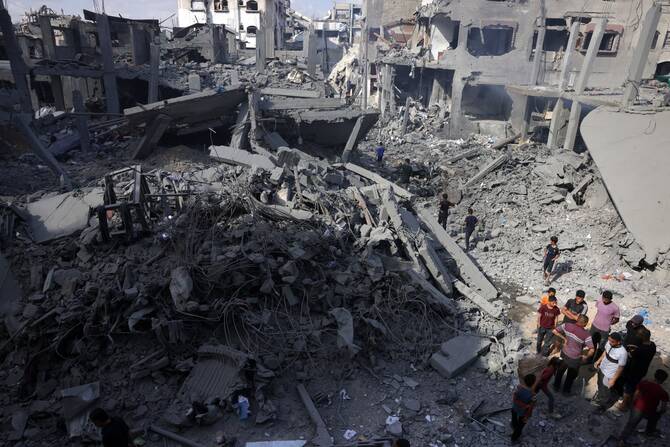
- ARAB NEWS
- 20 Aug 2025

As our news feeds overflow with reports of the latest Israeli airstrike or diplomatic maneuver, it is easy to lose sight of the foundational injustice at the heart of the Israeli-Palestinian conflict. For Palestinians, Nakba Day — marked each year on May 15 — serves as a somber reminder of that original sin: the mass dispossession and displacement of more than 750,000 Palestinians in 1948.
This was not a tragic accident of war. It was a deliberate policy of ethnic cleansing that gave birth to a state by erasing a people. Entire communities were displaced at gunpoint. Villages were razed. Families fled with little more than the clothes on their backs — never allowed to return.
Today, Gaza is experiencing what many call a second Nakba. Yet few in the international community acknowledge that the majority of Gazans are themselves refugees or descendants of refugees from towns and villages in southern Palestine. What we see unfolding in real time is not separate from the Nakba — it is its continuation.
Now, nearly eight decades later, the world must confront not just the consequences of that displacement, but its truth. This requires more than statements of sympathy. It requires a reckoning with the facts of what was taken — and from whom.
What we see unfolding in real time is not separate from the Nakba — it is its continuation
Daoud Kuttab
On Thursday, at the National Press Club in Washington, one Palestinian family is stepping forward to tell that story with irrefutable documentation. Adel Bseiso, a Palestinian American, is unveiling a trove of meticulously preserved records collected by his grandfather, Mahrous Mustafa Bseiso. These include original land deeds, tax records, sales contracts and correspondence — legal documents that trace the family’s extensive landholdings in and around Beersheba, in the Negev region of southern Palestine.
Mahrous, like many Palestinians, believed in building a life through honest labor and land stewardship. He turned desert tracts into productive farmland, orchards and businesses. That legacy, however, was violently interrupted in 1948, when Israeli forces occupied Beersheba and expelled its Palestinian population. The Bseiso family, along with tens of thousands of others, lost everything.
Adel was born in the West Bank town of Al-Bireh and later emigrated to the US. He grew up with his father, Jawdat Mahrous Bseiso — a once-promising young heir to the family’s legacy who was forever haunted by the events of the Nakba. Jawdat never recovered. “He was often in a trance,” Adel recalls. “He kept asking ‘what happened to us? How could everything be taken and no one be held accountable?’”
Answering these questions became Adel’s life mission. His search led him to create the Bseiso Family Archive, which is now considered to be the largest known collection of original land ownership documents from a single Palestinian family displaced in 1948. In 2025, after years of digitization and collaboration, the archive was officially published online in partnership with Columbia University’s Edward Said Modern Arab Studies Program.
This initiative is not about revenge. It is about recognition. For Adel and thousands like him, justice begins with truth. The Bseisos are not demanding the impossible. They are demanding the same as any dispossessed people: acknowledgment, accountability and dignity.
Palestinians continue to call for a comprehensive and just solution, grounded in international law and basic human rights
Daoud Kuttab
Palestinians continue to call for a comprehensive and just solution, grounded in international law and basic human rights. The right of return, enshrined in UN General Assembly Resolution 194, remains a cornerstone of that vision. Whether through actual return or compensation and resettlement, the principle that no one should profit from ethnic cleansing must be upheld.
But Israel has not only refused to acknowledge the Nakba — it has actively sought to erase its consequences by denying the very existence of Palestinian refugees. One of the clearest examples of this campaign is its effort to delegitimize UNRWA, the sole UN body dedicated to Palestinian refugees.
For generations, UNRWA has provided education, healthcare and essential services. But it is also a symbol of international recognition and hope for millions uprooted by war and occupation. By seeking to dismantle this agency, Israel aims to erase both the humanitarian lifeline it offers and the legal status of Palestinian refugees. It believes that if UNRWA ceases to exist, so too will the right of return. This is not just bureaucratic maneuvering — it is an attack on identity, history and justice.
Despite everything that has happened since 1948 — through the war of 1967, the intifadas and the devastation since Oct. 7, 2023 — Palestinians have not abandoned the call for a just and comprehensive resolution. They are not asking for special treatment. They are asking that the world live up to its promises. They are asking that international law be more than just words on paper.
The question of responsibility cannot be indefinitely postponed. Without addressing the root cause of Palestinian dispossession, no two-state solution, no ceasefire and no negotiation will ever be complete. Any meaningful peace must begin by recognizing who was displaced, how and by whom.
On this Nakba Day, as Palestinians mark 77 years of loss and resilience, the world must confront an uncomfortable truth: the suffering did not begin on Oct. 7, 2023, or even in 1967. It began in 1948, when a nation was built by uprooting another.
The Bseiso archive is more than a collection of yellowing papers. It is a living challenge to a historical erasure that has gone on far too long. And it is a testament to the enduring Palestinian demand — not just for justice, but for truth.
X: @daoudkuttab